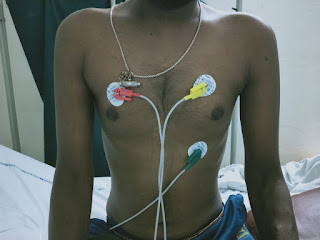Bimonthly assessment January
a) Problem representation : 26yr old female with k/c/o SLE Polyarthritis with head ache since 8 days and fever, vomtings since 4 days and altered sensorium since 2 days with Euvolemic hyponatremia under evaluation.
Anatomical localization: Brain.
b) etiology: CVA , TB Meningitis , SLE vasculitis ,SIADH secondary to infection.
https://www.ncbi.nlm.nih.gov/pmc/articles/PMC3970554/(proton pump for corticosteroid ulcers)
https://pubmed.ncbi.nlm.nih.gov/10067053/ ( TB Meningitis in SLE pts)
C) Bisphosphonates were given to prevent osteoporotic fracture risk associated with using long-term steroids.
https://www.ncbi.nlm.nih.gov/pmc/articles/PMC5357611/Bisphosphonate prophylaxis
d) Probable cause of normal CSF count in patients of Chronic meningitis is probably due to the use of steroids which caused immunosuppression and decreased inflammatory
was the research question in the above thesis presentation?
The research question
1)will salt restricted diet decrease blood pressure?
2)can 24hr urinary sodium test reflect the amount of sodium consumed by an individual
What was the researcher's hypothesis?
Hypothesis is that, salt restriction doesn't effect blood pressure in all the individuals in the same way
What is the current available evidence for the utility of monitoring salt excretion in the hypertensive population
The 24hr urinary sodium
Calculation for estimation of salt or sodium intake
Na (mg/day) = Na (mmol/day) x 23; NaCl = Na (g/day) x 100/ 39,3
1 gram salt (NaCl) = 393,4 mg Na = 17,1 mmol Na
What was the research question in the above thesis presentation?
The research question in the above thesis is whether magnesium plays a role in complications of diabetes mellitus
What was the researcher's hypothesis?
The researcher's hypothesis is that hypomagnesemia causes complications of dm2 irrespective of other confounding factors like age,duration of diabetes.
What is the current available evidence for magnesium deficiency leading to poorer outcomes in patients with diabetes?
3)Please critically appraise the full text article linked below:
What is the efficacy of aspirin in stroke in your assessment of the evidence provided in the article. Please go through the RCT CASP checklist here https://casp-uk.net/casp-
Clinical appraisal of the article:
1)The study answered the research question
being the use of asprin for prevention of stroke progression.
it was foccused in terms of intervention given and outcome measured
2)the method for randomisation was appropriate eliminating systematic bias and allocation sequence concealed from investigators and participants
3)all the participants included in the study were accounted for, including rhe two parcels whixh were accidentally opened.
4)the participants and the investigators were blind methodically
5)the study groups were similar
6)apart from the experimentation, the hospital care given is not documented
7)there were dropouts in the study, study medication was interrupted in few due to suspected side effects,
the p value was not mentioned
8)the cI interval 95%0.6-1.45
9)the treatment effect wasn't much,
10)the outcomes are benefial to my population in prescribing anticoagulants
dual vs single antiplatelet use and longer duration of followup could have been made .
4) Please mention your individual learning experiences from this ..
Management if malignant HTN
Management of anemia
Management of aplastic anemia
Blood transfusion reactions
Management of cardiac failure
Assisted in central line
Cardiothoracocentesis
5) a) What are the possible reasons for the 36 year old man's hypertension and CAD described in the link below since three years?
The possible reasons for hypertension and cad in the given history could be
Alcohol
Smoking
b) Please describe the ECG changes and correlate them with the patient's current diagnosis.
The ecg suggests:
1st ecg-irregularly irregular rythmn,normal axis,
Intermittent broad qrs complexes ? ventricular escape rythmn,?idioventricular rythmn
Remaining ecg-poor r wave progression with regular rythmn
c) Share an RCT that provides evidence for the efficacy of primary PTCA in acute myocardial infarction over medical management. Describe the efficacy in a PICO format.
RITA-2 is a randomized control trial published in
Journal of the American College of Cardiology Clinical Trials Vol. 42, No. 7, 2003 © 2003 by the American College of Cardiology Foundation Published by Elsevier Inc.
P-1018,Patients were recruited at 20 centers in the U.K. and Ireland. In brief, patients with arteriographically proven coronary artery disease (CAD) were considered for the trial if the supervising cardiologist thought that continued medical therapy and PTCA were both acceptable treatment options. Patients had to be over 18 years of age, but there was no upper age limit.
I-The 1,018 patients were randomized to coronary angioplasty (n 504) or continued medical treatment (n 514) from July 1992 to May 1996. Follow-up to September 30, 2001, is included in this report, the median follow-up period being seven years.
C-compared based on death and MI
subsequent interventions required
relief of symptoms of angina and breathless



Comments
Post a Comment